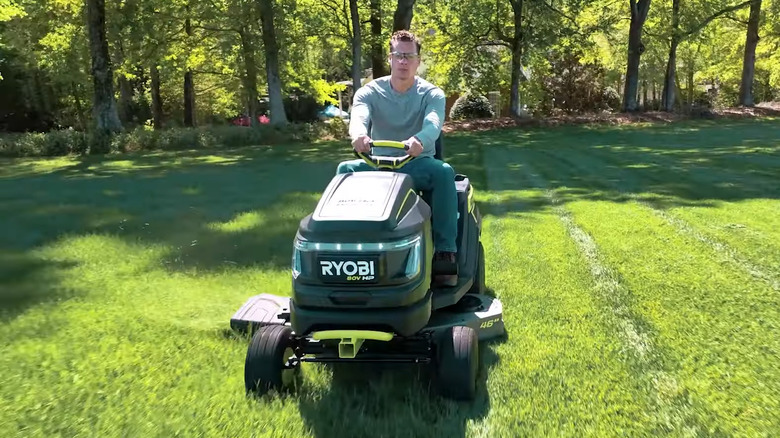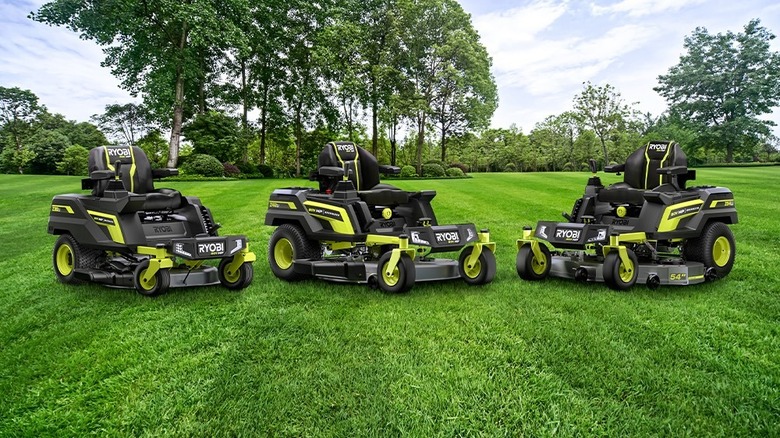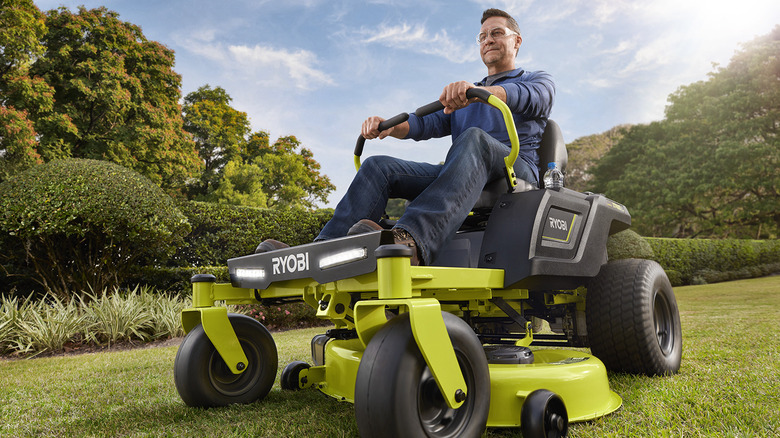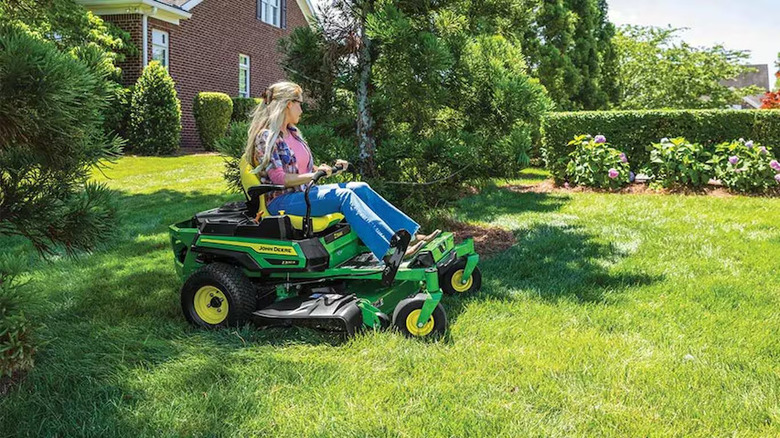Everything You Need To Know About Ryobi's Riding Lawn Mowers Before You Buy
For people who have managed to purchase homes and properties that have a lot of land, one task you will often find yourself doing is mowing your lawn with a major brand's lawn mower. Unless you hire professionals to maintain your property on a regular basis, you will have to get out in the yard and cut the grass yourself if you want to keep your front or back yard trimmed and tidy. Depending on the size of your yard, a traditional lawn mower that you walk behind and push may just be too much of a burden, which is when you turn to lawn mowers that you are able to ride on.
These lawnmowers are big, expensive tools that increase the efficiency with which you are able to mow large swaths of land. If you are out in the spacious suburbs or find yourself on a ranch, having this kind of lawn mower can be quite the time saver. Many different companies out there make riding lawn mowers, and among them is one of the best-selling tool companies in the United States, Ryobi. It actually offers seven different riding lawn mowers of several different sizes — along with other kinds of mowers — that utilize a variety of different designs and power sources. If you are in the market for a Ryobi mower, you should choose the one that is right for your specific needs.
Ryobi has a variety of mowers powered by 80V batteries
The riding lawn mowers offered by Ryobi run on battery power. Traditionally, lawn mowers — like a lot of larger power tools — have run on gasoline, but in an effort to be more environmentally conscious, Ryobi offers five of its seven riding lawn mowers with an 80V lithium battery power source. This same battery works with a 30-inch deck size model all the way up to a 54-inch one. This remains true whether the model you get is a zero turn riding mower, which utilizes a side joystick for operation, or a lawn tractor, which implements a traditional steering wheel. All of these lawn mowers are able to generate at least 7-8 hp, which is plenty for cutting your grass.
With an LED screen located on the arm of your seat, you are able to not just monitor your mower's battery life and remaining running time but also adjust the speed of both the cutting and driving. That panel also allows you to turn on and off the mower's headlights and lets you connect a Bluetooth device, like your iPhone, in order to use the Ryobi Riding Mower app. Plus, there are two USB ports for charging your phone while you mow your lawn.
All of the 80V battery-powered riding lawn mowers are naturally side-discharge models, which just means that it sprays the cuttings out of the side of the mower. However, several of the models also have the capability for you to bag your clippings instead, though you will need to purchase additional kits for that, and the same can be said for mulching kits. In terms of price, the lowest a battery-powered riding mower goes for is $2,999, and they go up to $4,999, with most towards the upper tier number.
A couple of 48V battery options available too
Ryobi also offers two models that run on Ryobi's 48V battery in the 50 Ah and 100 Ah variations. These mowers come with deck sizes of 30 inches to just 42 inches, with lawn tractor and zero turn mower options. Compared to the equivalent sizes of the 80V models, they can cut around the same amount of grass on a single charge. They also have the ability to add on additional kits for mulching and bagging at an additional price.
What the Ah lacks is a lot of the higher tech convenience features. For instance, there is a screen that tells you what percentage of the battery you have left, but you do not have the same flexibility for cutting or driving speeds for this mower or the ability to connect to the Ryobi Riding Mower app with Bluetooth. Even though they are battery-powered, these operate more like your traditional gas-powered riding mower. On the 42-inch model, you are treated to one USB charging port, though.
Price-wise, there is not much difference between the 80V and 48V Ah models. The 30-inch will cost you $2,999 no matter what, and actually, the 42-inch Ah model is $4,999 compared to $4,499 for the 80V at the time of writing. Meanwhile, the lowest customer rating for an 80V mower is 4.2 stars, while none of the Ah ones get over 3.8. That is due in large part to battery complaints, which is precisely what separates the two Ryobi mower branches. If you're looking for a Ryobi riding lawn mower, the 80V selections are likely your best bet.
How Ryobi electric mowers stack up against gas-powered ones
If you are someone looking to get a riding lawn mower for the first time or want to get a replacement for the gas-powered mower you already have, you may be wondering why you should be getting one of these battery-powered mowers — be it a lawn tractor or zero turn mower — from Ryobi and not just a gas-powered one instead. Take a brand like John Deere, which offers a plethora of different riding mowers, most of which operate on gasoline fuel. For one specific example, the company offers a John Deere zero turn mower with a 42-inch deck, just as Ryobi does, but instead of an 80V battery, it has a 3-gallon tank for fuel.
In terms of raw numbers, the two mowers are nearly identical. Both are able to mow up to two acres of grass without a refuel or recharge. The Ryobi utilizes three brushless motors to generate the equivalent of 21 hp from the engine, and the John Deere maxes out at 21.5 hp with its V-Twin. However, it is important to note that filling a tank takes less time than re-charging a battery. Ultimately, there are a few other big differences between the mowers.
First is the environmental impact, as gasoline is still a harmful fossil fuel that the Ryobi doesn't use at all. Secondly, Ryobi is has better tech features like connecting it to Bluetooth, which the John Deere does not offer. Electric mowers also tend to be quieter and tend to have less vibration. Last but not least is the price. The John Deere gas-powered mower costs $3,699, whereas the Ryobi retails for $4,499, and gas-powered mowers, typically, on the whole, will cost you less to purchase than an electric one. It's up to you to decide if the price benefit outweighs the benefits of the Ryobi electric mowers.



